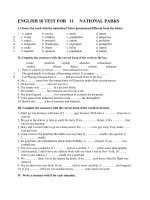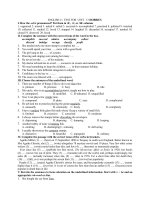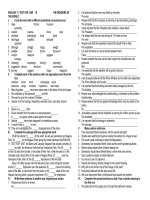- Trang chủ >>
- Đề thi >>
- Đề thi lớp 11
ENGLISH 11 TEST FOR UNIT 5
Bạn đang xem bản rút gọn của tài liệu. Xem và tải ngay bản đầy đủ của tài liệu tại đây (89.14 KB, 6 trang )
ENGLISH 11 TEST FOR UNIT 5
I. Complete the sentences with the correct forms of the words from the box.
eradicate literate educate promote effect
honour volunteer provide participate mature
1. We were very pleased with the high level of in the charity events.
2. Humour is often far more than shouting.
3. I can see an increasing in how she understands the world.
4. They started a campaign for illiteracy in the summer of 2000.
5. I am deeply to be invited to this momentous occasion.
6. We congratulate James on his well-deserved to Chief Executive,
7. All the children are tested in basic
8. Did he do it , or did you make him?
9. The Red Cross is in charge of of emergency relief.
10. We found the program and informative.
II. Report each sentence using the verbs below and a to-infinitive clause. Use each verb once only.
If necessary, add an appropriate object after the verb.
advise agree ask call on propose hope order urge
volunteer warn remind invite threaten offer promise
1. 'If I were you, I'd read the exam questions very carefully.
He
2. 'Be quiet!'
He
3. 'The theater will be built next to' the town hall.'
They
4. 'Okay, I'll collect David from school.'
He
5. 'Please stay for a few more days.'
She
6. TH fight the ban on smoking in public places.'
He
7. 'I imagine I'll see Olivia at the party.'
He
8. 'Can you lend me ten pounds?'
He
9. 'The government should do more to help the homeless.'
He
10. 'I'll take the children into town.'
He
11. 'Don't swim out too far, boys.'
He
12. 'Don't forget to go to the supermarket after work.'
She
13. 'Would you like to come on a picnic with us, Jane?'
He
14. 'If you can't find anyone else, I'll drive you to the airport.'
He
15. 'I won't give you the money back if you keep on at me.'
He
III. Underline the correct verb. If either is possible, underline them both.
1. The committee agreed/ suggested to postpone the meeting until 11th August.
2. Emma insisted/ said that we should bring the children along.
3. The prime minister insisted/ wanted to discuss transport policy in the interview.
4. She said/ offered that she would call me back.
5. He expected/ advised to leave at 5.30 in the morning.
6. He claimed/ proposed that the subject of holiday pay should be raised at the next meeting.
7. The shop has guaranteed/ has promised that it will deliver the chairs by the end of the week.
8. She offered/ suggested to wait for the children to get ready.
9. Terry wanted/ suggested that I should stand in the student elections.
10. She refused/ requested that her brother should be invited too.
11. He longed/ promised to go back home and see his parents.
12. She promised/ volunteered that she would collect the children from school today.
IV. Complete the sentences with the appropriate phrases, using a clause
beginning with a to-infinitive clause or an -ing form of a verb.
leave the motorway at junction 3 buy a guide book
read through our notes do more exercise
reduce bus and train fares look after the children
listen to the BBC World Service go to the doctor
go for a long walk build it to the east of the city
1. To find my way around London; Les suggested
2. To encourage people to use public transport the council proposed
3. I'd been feeling unwell for a few days and my mother advised
4. I've putting on weight and my doctor has recommended
5. To avoid the road works, police have advised
6. She was going abroad for two weeks and I promised
7. To help us prepare for the exam, the teacher advised us
8. To improve her English pronunciation, the teacher recommended her
9. London urgently needs a new airport, and the government proposes
10. It was a lovely morning and Emma suggested
V. Report these sentences. Choose the most appropriate reporting verb in
parentheses. Make it active or passive as appropriate.
1. The teacher said to Jim, 'Would you give your book to Mary, please?'
(ask/ Tell/ order)
The teacher
2. The sign said, 'No parking in this area. Violators will be towed away.'
(invite/ warn/ force)
Drivers
3. The fire chief said, 'Everyone must leave the building immediately.'
(order/ remind/ allow)
Everyone
4. Before Bobby went to bed, his father said, 'Don't forget to brush your teeth.' (invite/ allow/ remind)
Before Bobby went to bed, his father
5. The teacher said to the students, 'You will have exactly one hour to complete the exam.' (order/
expect/ warn) .
The students
6. My garage mechanic said, 'You should get a tune-up every 5,000 miles.'
(ask/ order/ advise)
My garage mechanic
7. The factory manager said to the employees, 'Do not come late. If you do, you will lost your jobs.'
(ask/ warn/ encourage)
The employees
8. The sign on the side door says, 'Do not enter,' so we have to use a different door. (ask/ permit/ force)
Nobody
9. The judge said to the defendant, 'You must not shout in the courtroom again.' (ask/ order/
encourage)
The defendant
10. My parents often said to me, 'Good for you! It's good to be independent!' (remind/ require/
encourage)
My parents
VI. Complete each of the sentences with one appropriate preposition.
1. The students were asked to provide reading and writing skills
the villagers.
2. More and more people are taking part the struggle against illiteracy.
3. Let's concentrate solving this problem before we discuss the other ones.
4. William insists getting up early, even on weekends.
5. Many companies participated the trade fair.
6. Many students have difficulty learning phrasal verbs.
7. The literacy rate of population rised considerably 1995 and 2002.
8. Each exercise focuses a different grammar point.
9. Interest physical fitness increased during the 1980s.
10. Do you consider these textbooks essential the course?
VII. Write the second sentence so that it has a similar meaning to the first.
1. Just when he arrived at the station, the train was starting to move.
Hardly
2. Let's go for a walk. We've been working all day.
John suggested
3. The cake was so hard that I could not eat it.
It was
4. 'You'd better not waste your time, Betty,' Tom said.
Tom
5. I am sorry that I didn't invite her to my party last night.
I regret
6. Mike's father is going to fix the ball for him next week.
Mike
7. It is at Mr. Foster's request that I'm writing this letter to you.
Mr Foster
8. The cost of living has gone up considerably in the last few years.
There has been
9. I expect that they will get there by lunch time.
I expect them
10. I'm sorry I couldn't come to your birthday party last Sunday, John.
Mary apologizes
ILLITERACY
IV. Complete the sentences with the correct forms of the words from the box.
eradicate literate educate promote effect
honour volunteer provide participate mature
11. We were very pleased with the high level of participation in the charity events.
12. Humour is often far more effective than shouting.
13. I can see an increasing maturity in how she understands the world.
14. They started a campaign for illiteracy eradication in the summer of 2000.
15. I am deeply honoured to be invited to this momentous occasion.
16. We congratulate James on his well-deserved promotion to Chief Executive,
17. All the children are tested in basic literacy.
18. Did he do it voluntarily, or did you make him?
19. The Red Cross is in charge of provision of emergency relief.
20. We found the program educational and informative.
V. Report each sentence using the verbs below and a to-infinitive clause. Use each verb once
only. If necessary, add an appropriate object after the verb.
advise agree ask call on propose hope order urge
volunteer warn remind invite threaten offer promise
16. 'If I were you, I'd read the exam questions very carefully.
He advised us to read the exam questions very carefully.
17. 'Be quiet!'
He ordered us to be quiet.
18. 'The theater will be built next to' the town hall.'
They proposed to build the theater next to the town hall.
19. 'Okay, I'll collect David from school.'
He agreed to collect David from school.
20. 'Please stay for a few more days.'
She urged me to stay for a few more days.
21. TH fight the ban on smoking in public places.'
He promised to fight the ban on smoking in public places.
22. 'I imagine I'll see Olivia at the party.'
He hoped to se? Olivia at the party.
23. 'Can you lend me ten pounds?'
He asked me to lend him ten pounds./ He asked to borrow ten pounds.
24. 'The government should do more to help the homeless.'
He called on the government to do more to help the homeless.
25. 'I'll take the children into town.'
He offered to take the children into town.
26. 'Don't swim out too far, boys.'
He warned the boys not to swim too far.
27. 'Don't forget to go to the supermarket after work.'
She reminded me to go to the supermarket after work.
28. 'Would you like to come on a picnic with us, Jane?'
He invited Jane to come on a picnic with them.
29. 'If you can't find anyone else, I'll drive you to the airport.'
He volunteered to drive me to the airport (if I couldn't find anyone else).
30. 'I won't give you the money back if you keep on at me.'
He threatened not to give me/ us the money back (if I/ we kept on at him).
VI. Underline the correct verb. If either is possible, underline them both.
13. The committee agreed/ suggested to postpone the meeting until 11th August.
14. Emma insisted/ said that we should bring the children along.
15. The prime minister insisted/ wanted to discuss transport policy in the interview.
16. She said/ offered that she would call me back.
17. He expected/ advised to leave at 5.30 in the morning.
18. He claimed/ proposed that the subject of holiday pay should be raised at the next meeting.
19. The shop has guaranteed/ has promised that it will deliver the chairs by the end of the week.
20. She offered/ suggested to wait for the children to get ready.
21. Terry wanted/ suggested that I should stand in the student elections.
22. She refused/ requested that her brother should be invited too.
23. He longed/ promised to go back home and see his parents.
24. She promised/ volunteered that she would collect the children from school today.
VII. Complete the sentences with the appropriate phrases, using a clause
beginning with a to-infinitive clause or an -ing form of a verb.
leave the motorway at junction 3 buy a guide book
read through our notes do more exercise
reduce bus and train fares look after the children
listen to the BBC World Service go to the doctor
go for a long walk build it to the east of the city
11. To find my way around London; Les suggested buying a guide book
12. To encourage people to use public transport the council proposed to reduce/ reducing bus and
train fares
13. I'd been feeling unwell for a few days and my mother advised going to the doctor
14. I've putting on weight and my doctor has recommended doing more exercise
15. To avoid the road works, police have advised leaving the motorway at junction 3
16. She was going abroad for two weeks and I promised to look after the children
17. To help us prepare for the exam, the teacher advised us to read through our notes
18. To improve her English pronunciation, the teacher recommended her to listen to the BBC World
Service
19. London urgently needs a new airport, and the government proposes to build/ building it to the east
of the city
20. It was a lovely morning and Emma suggested going for a long walk
VIII. Report these sentences. Choose the most appropriate reporting verb in
parentheses. Make it active or passive as appropriate.
11. The teacher said to Jim, 'Would you give your book to Mary, please?'
(ask/ Tell/ order)
The teacher asked Jim to give his book to Mary.
12. The sign said, 'No parking in this area. Violators will be towed away.'
(invite/ warn/ force)
Drivers were warned not to park in the area.
13. The fire chief said, 'Everyone must leave the building immediately.'
(order/ remind/ allow)
Everyone was ordered to leave the building immediately.
14. Before Bobby went to bed, his father said, 'Don't forget to brush your teeth.' (invite/ allow/ remind)
Before Bobby went to bed, his father reminded him to brush his teeth.
15. The teacher said to the students, 'You will have exactly one hour to complete the exam.' (order/
expect/ warn) .
The students were expected to complete the exam in one hour.
16. My garage mechanic said, 'You should get a tune-up every 5,000 miles.'
(ask/ order/ advise)
My garage mechanic advised me to get a tune-up every 5,000 miles.
17. The factory manager said to the employees, 'Do not come late. If you do, you will lost your jobs.'
(ask/ warn/ encourage)
The employees were warned not to be late.
18. The sign on the side door says, 'Do not enter,' so we have to use a different door. (ask/ permit/ force)
Nobody is permitted to use the side door.
19. The judge said to the defendant, 'You must not shout in the courtroom again.' (ask/ order/
encourage)
The defendant was ordered not to shout in the courtroom again.
20. My parents often said to me, 'Good for you! It's good to be independent!' (remind/ require/
encourage)
My parents often encouraged me to be independent.
IX. Complete each of the sentences with one appropriate preposition.
11. The students were asked to provide reading and writing skills for the villagers.
12. More and more people are taking part in the struggle against illiteracy.
13. Let's concentrate on solving this problem before we discuss the other ones.
14. William insists on getting up early, even on weekends.
15. Many companies participated in the trade fair.
16. Many students have difficulty in learning phrasal verbs.
17. The literacy rate of population rised considerably between 1995 and 2002.
18. Each exercise focuses on a different grammar point.
19. Interest in physical fitness increased during the 1980s.
20. Do you consider these textbooks essential for the course?
IX. Write the second sentence so that it has a similar meaning to the first.
1. Just when he arrived at the station, the train was starting to move.
Hardly did he arrive at the station when the train was starting to move.
2. Let's go for a walk. We've been working all day.
John suggested going for a walk.
3. The cake was so hard that I could not eat it.
It was such a hard cake that I could not eat it.
4. 'You'd better not waste your time, Betty,' Tom said.
Tom advised Betty not to waste her time.
5. I am sorry that I didn't invite her to my party last night.
I regret not inviting/ having invited her to my birthday party the night before.
6. Mike's father is going to fix the ball for him next week.
Mike is going to have his father fix the ball next week.
7. It is at Mr. Foster's request that I'm writing this letter to you.
Mr Foster requested me to write this letter to you.
8. The cost of living has gone up considerably in the last few years.
There has been a considerable rise in the cost of living for the last few years.
9. I expect that they will get there by lunch time.
I expect them to get there by lunch time.
10. I'm sorry I couldn't come to your birthday party last Sunday, John.
Mary apologizes for not coming to John's birthday party last Sunday.









